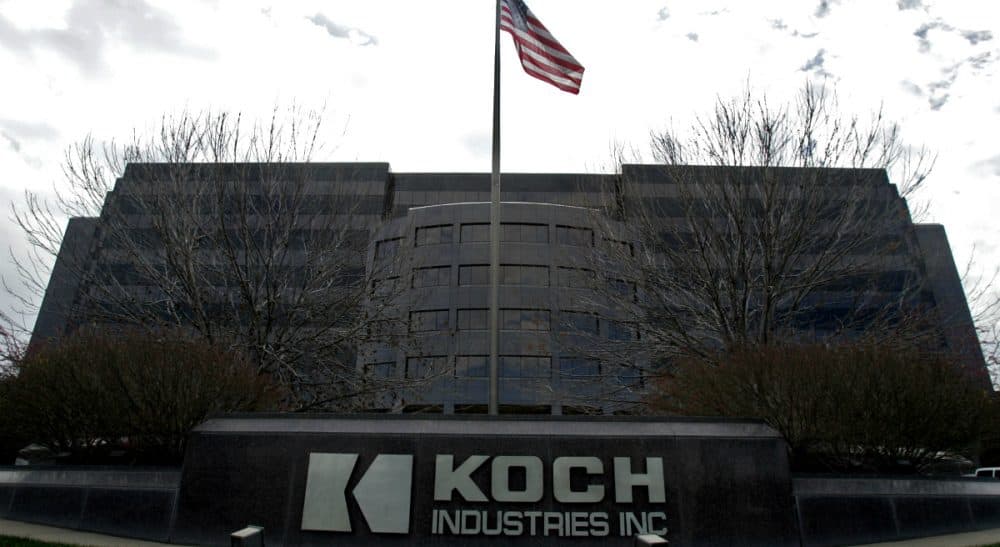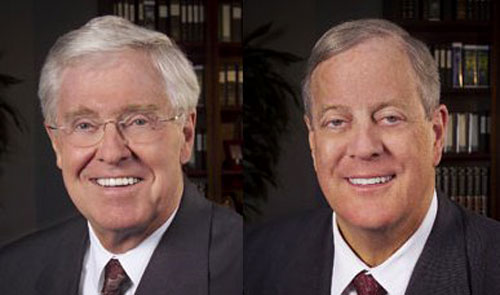Advertisement
Evil, Rebranded? The Koch Brothers In 2016

Perhaps I spook too easily. But Jane Mayer’s recent New Yorker piece, “New Koch,” about Charles and David Koch’s plan to rebrand themselves — as compassionate people — left me wide-eyed.
Before I read the article, I thought I’d at least vaguely grasped the scope of their intrusion into our politics. But I hadn’t. And intrusion understates it; they’re a conquering force intent on controlling the way we’re governed. Two small examples from the piece that hint at what I’d missed:
1. Twelve hundred people work full time for the Koch’s libertarian political network, Americans for Prosperity, which is three times the number of people who work for the Republican National Committee.
They are spending millions to disguise their actual aims so they can lull citizens into thinking it’s safe to allow them more control over our political system.
2. Charles Koch has organized a small group of “ultra-wealthy conservatives” to spend almost $900 million “on campaigns and advocacy” in the 2016 elections. Mayer writes, “This private jackpot is more than twice the sum that was spent by the Republican National Committee in the 2012 Presidential race.”
But even more appalling than the magnitude is Mayer’s revelation of the brothers’ methods. Under the tutelage of PR experts, the Kochs have come around to the opinion that Mitt Romney took a drubbing in 2012 because most Americans believe — in the words of Arthur Brooks, a Koch ally who runs the American Enterprise Institute — that Democrats are “fair” and “help the vulnerable,” while Republicans are “money guys."
In other words, many Americans aren’t down with rich ultra-conservatives’ apparent lack of empathy for people who have troubles — like struggling to pay medical bills, or rents or mortgages, or to educate kids, and who sometimes benefit from government programs.
The brothers’ solution? To make it look like they value fairness and want to help the vulnerable. Recently they’ve been giving money to groups like The United Negro College Fund, and making advertisements in which they portray themselves as empathetic and benevolent. They are spending millions to disguise their actual aims so they can lull citizens into thinking it’s safe to allow them more control over our political system.
Advertisement

Meanwhile, their libertarian goals — which include weakening the federal government and its safety net programs, and undermining “environmental, health, and safety regulations nationwide,” — work against the 99 percent. There are occasional places — for example, prison reform — where their agenda overlaps with more humane ends, and they are intent on particularly showcasing these while hiding much else.
Rebranding is one of those words that makes me queasy. Whenever I hear it — too often these days — I cringe. Why is everyone suddenly a brand? Worse though, after reading Mayer, I have come to feel that the Koch brothers' effort at rebranding themselves is a euphemism for an undertaking which is much more seriously deceptive, and may actually be evil. Evil is a strong word, I know. But its meaning, “immoral and malevolent,” fits well here.
My own litmus test for evil comes from Shakespeare. Arguably, the most evil of the Bard’s characters is Iago, who, you remember, intentionally and maliciously deceives Othello until the crazed general murders his own wife — the one person he really loves. The play reminds us that there are few more extreme debasements of humanity than purposely misleading a person to destroy what they actually need and care about.
there are few more extreme debasements of humanity than purposely misleading a person to destroy what they actually need and care about.
We never fully know Iago’s motives, for he refuses to explain himself. But he does utter one revelatory sentence, “I am not what I am.”
“I am not what I am,” succinctly describes a way of being in the world that breaks all bonds of trust. It’s not only the inscription we’d want on T-shirts worn by sociopaths to protect us from their cons, but it’s a pretty good giveaway that someone’s not to be trusted. And I’ve long felt it offers a clear view of one aspect of evil.
The Kochs meet the “Iago standard” because they are attempting to earn trust for their political goals by selling a carefully designed, false image of themselves and their political intentions; an image that is in fact opposite to their intent. They are not who they pretend to be.
Now that Jane Mayer has unmasked them, the rest of us need to call out their toxic feint and demand reform to constrain dark money’s mind-boggling influence. It’s going to be hard because they’ve already bought a lot of legislators. But it’s a fight worth joining.
